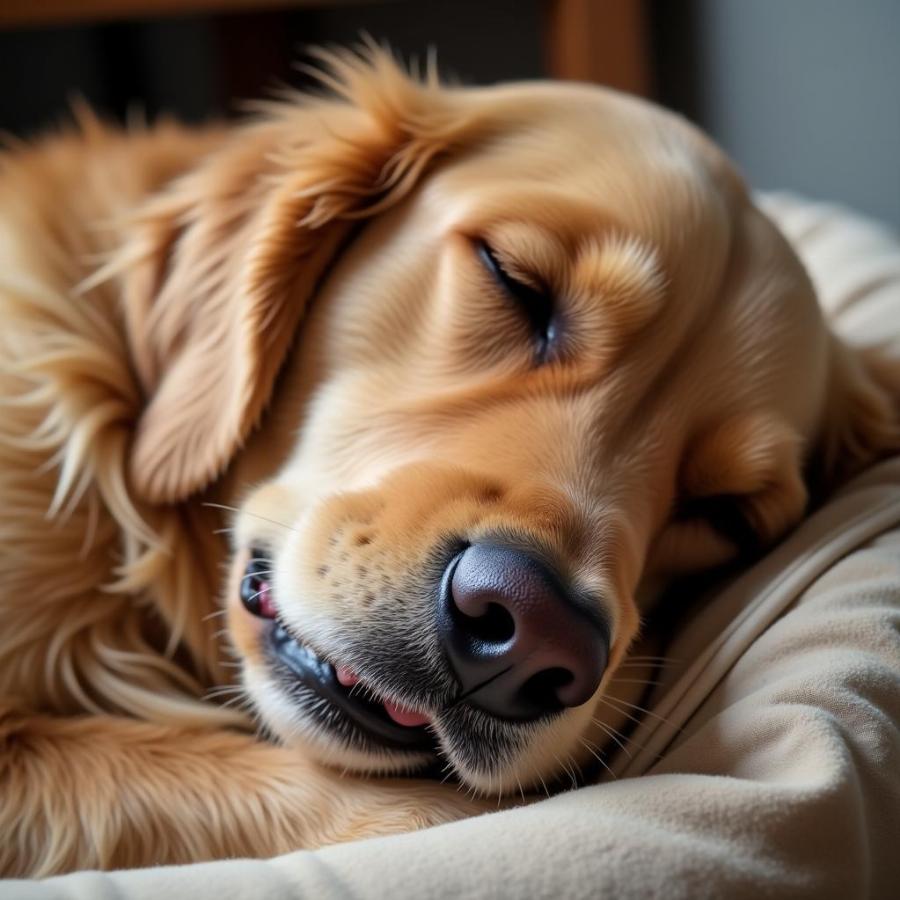Have you ever been startled awake by your furry friend letting out a howl in the middle of the night? While it can be a bit unnerving, howling in their sleep is a common canine behavior. But why exactly do our beloved dogs howl in their sleep? Let’s dive into the fascinating world of canine dreams and decipher the mysteries behind those sleepy-time sounds.
Dreaming of Chasing Rabbits?
Just like humans, dogs experience different sleep stages, including REM sleep, the stage associated with dreaming. During this stage, dogs’ brains are highly active, and they may twitch, whimper, bark, or even howl as they process the images and sounds of their dreams. While we can’t know for sure what they’re dreaming about, it’s thought that dogs often dream about activities from their daily lives, such as chasing squirrels, playing fetch, or cuddling with their favorite humans.
 Dog Sleeping and Howling
Dog Sleeping and Howling
More Than Just Dreams
While dreaming is a common reason for sleep howling, other factors can contribute to this nighttime serenade.
Anxiety or Stress:
If your dog is experiencing anxiety or stress, they may howl in their sleep as a way to release pent-up tension. Changes in routine, loud noises, or separation anxiety can trigger stress in dogs.
Communication:
Howling is a natural form of communication for dogs, and they may howl in their sleep to express a need or desire. For instance, a dog who needs to go potty might let out a howl to get their owner’s attention.
Medical Conditions:
In some cases, howling in sleep can be a sign of an underlying medical condition such as pain, cognitive decline, or hearing loss. If your dog’s sleep howling is persistent or accompanied by other concerning symptoms, it’s essential to consult with your veterinarian.
Should I Wake a Sleeping (and Howling) Dog?
It’s generally best to let sleeping dogs lie, even if they’re making some noise. Waking a dog abruptly from a deep sleep can be disorienting and even frightening for them. However, if you’re concerned about your dog’s howling, you can try gently rousing them from a distance by speaking their name softly. If the howling is persistent or accompanied by other unusual behaviors, consult your veterinarian.
Creating a Peaceful Sleep Haven
To help your dog sleep soundly through the night, create a comfortable and secure sleeping environment:
- Cozy Bedding: Provide your dog with a soft and supportive bed in a quiet area of your home.
- Consistent Routine: Stick to a regular sleep-wake cycle for your dog, just like you would for yourself.
- Exercise and Enrichment: Ensure your dog gets enough exercise and mental stimulation during the day to tire them out for a good night’s sleep.
- Address Anxiety: If you suspect your dog’s sleep howling is related to anxiety, consider using calming aids like pheromone diffusers or consult a certified dog trainer or behaviorist.
When to Seek Professional Help
If your dog’s sleep howling is frequent, intense, or accompanied by other behavioral or physical changes, it’s crucial to seek veterinary attention. Your veterinarian can help determine if there’s an underlying medical condition and recommend appropriate treatment options.
Frequently Asked Questions
Q: Is it normal for my dog to howl in their sleep?
A: Yes, occasional sleep howling is a normal canine behavior and is often related to dreaming.
Q: My dog never used to howl in their sleep, but now they do it every night. Should I be worried?
A: If your dog’s sleep howling is a new or sudden development, it’s best to consult your veterinarian to rule out any medical causes.
Q: Can I train my dog to stop howling in their sleep?
A: It’s generally not recommended to try to train a dog to stop howling in their sleep, as it’s often an involuntary behavior related to dreaming or other factors beyond their control.
Q: My dog’s sleep howling is keeping me up at night. What can I do?
A: Consider using earplugs or a white noise machine to minimize the disturbance.
Learn More About Your Dog’s Sleep Habits
Want to learn more about why your dog does the things they do, especially those curious nighttime behaviors? Check out our article on why does my dog whine at night to understand the reasons behind those plaintive sounds.
Beaut Dogs: Your Guide to Canine Companionship
Beaut Dogs is your one-stop resource for all things dog-related, offering expert advice and reliable information to help you provide the best possible care for your canine companion. For personalized guidance on your dog’s sleep habits or any other concerns, feel free to reach out to us at [email protected]. We’re here to help you and your furry friend navigate the wonderful world of dog ownership!